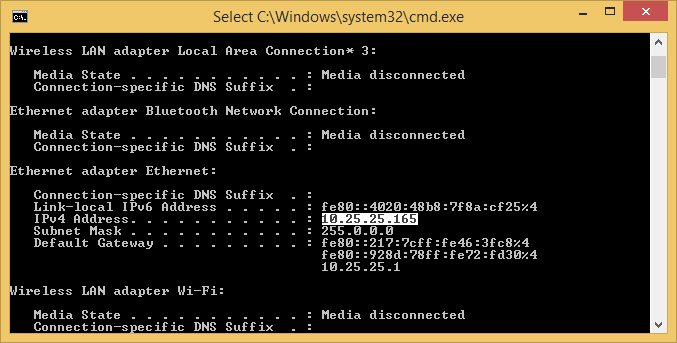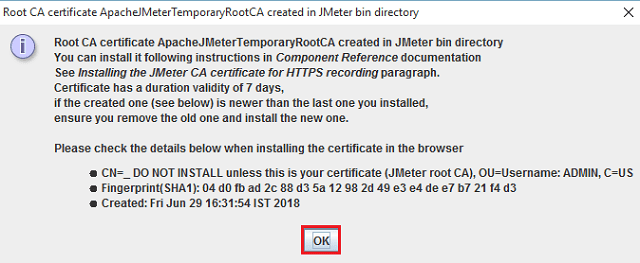

- #APACHE JMETER ROOT CA CERTIFICATE DOWNLOAD MANUAL#
- #APACHE JMETER ROOT CA CERTIFICATE DOWNLOAD SERIES#
Q #13) Can JMeter record actions from mobile? If yes, how?Īnswer: Yes, JMeter can record HTTP or Https request going to the server from your mobile application also.
#APACHE JMETER ROOT CA CERTIFICATE DOWNLOAD MANUAL#
Configure your browser with manual proxy settings pointing to the same port number used in the test script recorder.Choose the target either as “Workbench” or add a Recording Controller in your test plan and select the same target for storing all the recordings under it.Enter the port number to start your proxy server.Add HTTP(s) Test script recorder to WorkBench.The steps followed to record https traffic is: Some configurations require to be done in JMeter in order to make it work. Q #12) Explain the flow of the Test Script Recorder.Īnswer: HTTP(s) Test Script Recorder is used to record all the Http(s) requests going to the server from your application. There are different type of inbuild listeners in JMeter and many others can be imported into it by using plugins as per the requirement. Q #11) What are the different types of listeners?Īnswer: Listeners are used for storing the execution results of load testing in different forms be it in a table, graph, tree or in any other presentable format so that it can be presented to the client. Q #10) What is the use of co-relation in JMeter?Īnswer: Co-relation is a process of extracting the values from the server response and storing it in a variable to be used in any other request which is to follow.įor Example, for testing any login functionality if you have to use the session ID/cookie ID, you can extract the values from the response of GET Request of the login page and then dynamically use the same while making POST request for a login. Less technically sound as compared to Load Runner. Enlisted are some of the major differences:

Q #9) What are the major differences between JMeter and Load Runner.Īnswer: JMeter is considered as the major competitor of Load Runner in the industry. Difference between the two lies in the fact that how the lambda value is calculated in the case of Poisson timer and how deviation is calculated in the case of Gaussian Timer. Q #8) Explain the difference between Gaussian and Poisson Timers.Īnswer: Both Gaussian and Poisson Timers work on a mathematical formula with some constant delay and additional offset. the number of config elements or processors and it also depends on whether you are using GUI/Non-GUI Mode. Other factors that impact thread count are the number of components in your test plan i.e. Q #7) What are the maximum recommended threads on a single system?Īnswer: It depends on the hardware configuration of your system which includes a processor, JVM, allocated memory -Xmx, etc. Q #6) What are the different ways of Data Parameterization in JMeter?Īnswer: Data Parametrization makes the scripts reusable where the values is not required to be hardcoded for the same request with different parameters.īelow is the data parametrization that is supported in JMeter: They can be used to extract some fields from the server response and store them in variables. Pre-Processors execute before the main sampler and can change the scope of the sampler whereas Post Processors execute after the main sampler and are applicable to all samplers in the same scope of Test Plan. Q #5) What are the types of processors in JMeter?Īnswer: Basically there are two types of processors in JMeter namely Pre-Processor and Post Processor. Regular Expression is used in both Pre-Processors as well as Post Processors. These values can be used in the subsequent request or can be saved for reporting purposes. Q #4) What is the use of Regular Expression in JMeter?Īnswer: Regular Expression is used for extracting some values dynamically from the responses.

It is very important to note that all the machines should be on the same network and should have the same version of Java and JMeter The response can be viewed in HTML format but the actual timings are not present in the generated samples.Īnswer: Distributed Testing means using multiple machines for load testing in which one of the machines can be made master and others can be kept as a slave. It does not render the HTML webpages as the normal browser does. Q #2) Does JMeter simulate actual browser behavior?Īnswer: No, JMeter does not support the actual browser behavior. Unlike any browser, JMeter works on levels of protocols and does not execute JavaScript present in HTML web pages. It supports all major protocols that are supported in Load Runner. Q #1) Explain the architecture of JMeter.Īnswer: Jmeter is a Java-based open-source application that is basically designed for the purpose of Load Testing.
#APACHE JMETER ROOT CA CERTIFICATE DOWNLOAD SERIES#
=> Further reading: Read our Complete Free JMeter Tutorial series here. Most Important JMeter Interview Questions


 0 kommentar(er)
0 kommentar(er)
